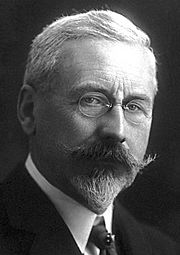Charles Édouard Guillaume facts for kids
Quick facts for kids
Charles Édouard Guillaume
|
|
|---|---|
 |
|
| Born | 15 February 1861 Fleurier, Switzerland
|
| Died | 13 May 1938 (aged 77) Sèvres, France
|
| Nationality | Swiss |
| Alma mater | ETH Zurich |
| Known for | Invar and Elinvar |
| Awards | John Scott Medal (1914) Nobel Prize in Physics (1920) Duddell Medal and Prize (1928) |
| Scientific career | |
| Fields | Physics |
| Institutions | Bureau International des Poids et Mesures, Sèvres |
Charles Édouard Guillaume (born February 15, 1861, in Fleurier, Switzerland – died May 13, 1938, in Sèvres, France) was a famous Swiss physicist. He won the Nobel Prize in Physics in 1920. He earned this award for his important discoveries about special metal alloys, especially those made of nickel and steel. These discoveries helped make very precise measurements in physics.
Contents
Early Life and Education
Charles-Edouard Guillaume was born in Fleurier, Switzerland. He started his education in Neuchâtel. Later, he earned a special degree called a doctoral degree in Physics from ETH Zurich in 1883.
Scientific Discoveries
Guillaume was the head of the International Bureau of Weights and Measures. This is an important place where they set standards for measurements like length and weight. He also worked with another scientist, Kristian Birkeland, at the Observatoire de Paris. There, he did many experiments, especially with how temperature affects things.
Special Metal Alloys
Guillaume is most famous for discovering two special metal alloys. He named them invar and elinvar.
- Invar: This metal is amazing because it barely changes size when the temperature changes. Scientists call this having a "near-zero coefficient of thermal expansion". This makes Invar perfect for building very accurate tools. These tools need to stay the exact same size, even if the room gets hotter or colder.
- Elinvar: This alloy is special because its springiness (or "modulus of elasticity") doesn't change much with temperature. This is very useful for making springs in instruments. For example, it's used in marine chronometers, which are super accurate clocks used on ships. Elinvar is also non-magnetic, which is helpful for antimagnetic watches.
Estimating Space Temperature
Guillaume was also one of the first scientists to try and figure out the temperature of space. In 1896, he wrote a paper called "La Température de L'Espace" (The Temperature of Space). In this paper, he estimated the "radiation of the stars." This idea was very new at the time. His work made him a pioneer in plasma cosmology, which is the study of conditions far away from any particular star. The concept he explored is now known as the Cosmic microwave background. He estimated the temperature of space to be about 5-6 K.
Contributions to Clocks
Charles Édouard Guillaume's father was a horologist, someone who makes and repairs clocks. Because of this, Guillaume became very interested in marine chronometers. These are very precise clocks used to tell time at sea.
He developed a special version of the Invar alloy. This new alloy helped fix a problem in clock parts called the "middle temperature" error. The Guillaume Balance, a type of balance wheel used in clocks, is named after him. It helps clocks keep very accurate time.
See also
 In Spanish: Charles Édouard Guillaume para niños
In Spanish: Charles Édouard Guillaume para niños
 | Isaac Myers |
 | D. Hamilton Jackson |
 | A. Philip Randolph |

